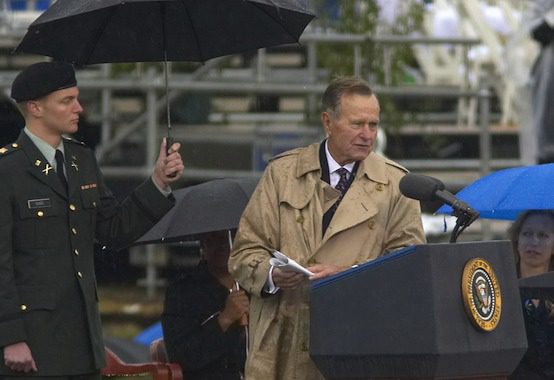Obama and Kerry: A Bush and Baker Restoration?

Like many—thousands? millions?—around the globe, I was glued to Laura Rozen’s twitter feed from Geneva on Saturday, fingers crossed for an Iran deal. Then we went out to dinner and a long movie, and when I returned it was done. As expected, it was a minimalist deal, in which neither Iran not the U.S. coalition conceded much in the nitty gritty of sanctions relief or nuclear scale-down. The deal does nonetheless promise to drain all the enriched uranium from the cartoon bomb Netanyahu waved in front of the UN last year, which raises the question of what further concessions Iran has available to make. (It’s not going to dismantle its nuclear program entirely.) And though the sanctions relief was minimal, in symbolic terms Tehran’s gains should not be underestimated. As one Iranian analyst pointed, though anti-Americanism has been a central ideological pillar of Iran’s government, signing an agreement with the United States has curiously legitimized it. The government has demonstrated it can negotiate with America without being humiliated—and if you know something of Iran’s history with the U.S., you can see how this would matter a great deal.
While Israel is not any kind of real loser in this negotiation—the Israeli stock market reached new highs on Sunday, as Israeli and global investors voted with their dollars—the more avowedly anti-regime Iranian groups certainly are. Does anyone now care about how the “formerly” designated terrorist MEK feels about the deal, a group catered to by American politicians across the spectrum? Or the Shah’s kid, Reza Pahlavi? My sense from Iranians I know is that these people are completely marginalized. The joy felt in Tehran is shared by Iranians the world over.
As the outlines of the deal were largely known before, the biggest news is that the Obama administration was conducting back-channel negotiations with Tehran through Nicholas Burns and Biden aide Jake Sullivan. Could such negotiations have been possible had Dennis Ross still held the Iran portfolio in the Obama administration? I doubt it. If Hillary had been secretary of state?
As one blog commenter pointed out, Biden’s top foreign-policy aide was meeting in Oman with Iranians at roughly the same moment that Biden was swearing “no daylight” between Israel and the U.S. at the annual AIPAC conference. This perhaps is the most significant foreshadowing: the United States has, for the first time in a long time, shown its ability to conduct its own diplomacy in the Mideast without checking with Israel first. It is surely why Zbgniew Brzezinski tweeted that the Obama-Kerry team is the most successful American foreign-affairs leadership since George H.W. Bush and James Baker, who navigated the end of the Cold War and the first Iraq war. I’m inclined to agree. Despite Obama’s FUBAR health plan—which will be fixed, or scrapped entirely, or something in between—a reorienting of American policy towards the Islamic world after the last disastrous decade of losing trillion-dollar wars will redeem his presidency.
One more thing: the reaction to the deal on Capitol Hill has been mostly negative, and Congress does have within its power the means to scuttle it. One scrolls through the comments of the lawmakers, with their obsessive namechecking of “our ally Israel” (the only one?), or in one case “our ally the Jewish Democratic State of Israel,” and one wonders what George Washington would have made of it. In almost all cases, these are people without strong foreign-affairs convictions, and they are saying simply what they believe politics requires them to say. It is therefor necessary that there be pushback, that these congressmen be reminded not only that most Americans support diplomacy but that the governments of China, Russia, France, Germany, and the UK all signed this agreement too, and all quite explicitly acknowledged that Iran has the right to a nuclear infrastructure, subject to agreement and monitoring that it is for peaceful purposes. Iran isn’t going to agree to dismantle all its centrifuges. And basically no one else in the world, beyond the medieval autocracies of the Gulf, and Israel, thinks that it should be required to to do so.
Comments